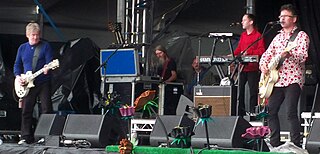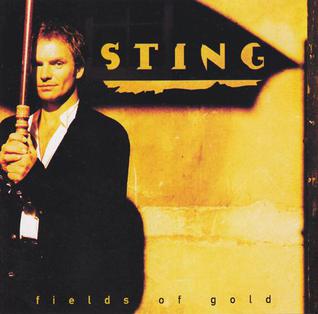
Culture Club are an English new wave band formed in London in 1981. The band comprises Boy George, Roy Hay, and Mikey Craig, and formerly included Jon Moss. Emerging in the New Romantic scene, they are considered one of the most representative and influential groups of the 1980s.

Bread was an American soft rock band from Los Angeles, California. They had 13 songs chart on the Billboard Hot 100 between 1970 and 1977.

Tanita Tikaram is a British pop/folk singer-songwriter. She achieved chart success with the singles "Twist in My Sobriety" and "Good Tradition" from her 1988 debut album, Ancient Heart.

Eurythmics were a British new wave duo formed in 1980, consisting of Scottish vocalist Annie Lennox and English musician and producer Dave Stewart. They were both previously in the Tourists, a band that broke up in 1980. They released their first studio album, In the Garden, in 1981 to little success, but achieved global acclaim with their second album, Sweet Dreams (1983). The title track became a worldwide hit, reaching number two in the UK Singles Chart, and number one in Canada and the US Billboard Hot 100. Eurythmics went on to release a string of hit singles and albums, including "Love Is a Stranger", "There Must Be an Angel " and "Here Comes the Rain Again", before splitting in 1990.

Bernard John Taupin is an English lyricist and visual artist. He is best known for his songwriting partnership with Elton John, recognised as one of the most successful partnerships of its kind in history. Taupin co-wrote the majority of John's songs, dating back to the 1960s.

The Corrs are an Irish family band consisting of siblings Andrea, Sharon, Caroline and Jim. Their music combines pop rock with traditional Irish themes. They are from Dundalk in County Louth, Ireland.

Vincent Grant Gill is an American singer, songwriter, and musician. He began in a number of local bluegrass bands in the 1970s, and from 1978 to 1982, he achieved his first mainstream attention as lead singer of the soft rock band Pure Prairie League. Gill sang lead on their hit single "Let Me Love You Tonight" in addition to writing several songs of theirs. After leaving Pure Prairie League, Gill briefly played guitar in Rodney Crowell's backing band the Cherry Bombs before beginning a solo career in country music in 1984. Gill recorded for RCA Records Nashville from then until 1988 with minimal success. A year later he signed with MCA Nashville, and he has recorded for this label ever since.

Paul Melvyn Carrack is an English singer, musician, songwriter and composer who has recorded as both a solo artist and as a member of several popular bands. The BBC dubbed Carrack "The Man with the Golden Voice", while Record Collector remarked: "If vocal talent equalled financial success, Paul Carrack would be a bigger name than legends such as Phil Collins or Elton John."

Aaron Joseph Neville is an American R&B and soul singer. He has had four platinum albums and four Top 10 hits in the United States, including three that reached number one on Billboard's Adult Contemporary chart. "Tell It Like It Is", from 1966, also reached the top position on the Soul chart for five weeks.

The Saw Doctors are an Irish rock band. Formed in 1986 in Tuam, County Galway, they have achieved eighteen Top 30 singles in the Republic of Ireland including three number ones. Their first number one, "I Useta Lover," topped the Irish charts for nine consecutive weeks in 1990 and holds the record for the country's all-time biggest-selling single. On 15 February 2008, they received a Lifetime Achievement Award at the Meteor Ireland Music Awards.

David Peter Gray is a British singer-songwriter. Having released his debut album in 1993, he received worldwide attention with White Ladder five years later, particularly for the hit single "Babylon". White Ladder was the first of three chart-toppers in six years for Gray in the UK, where it became the fifth best-selling album of the 2000s. In 2019, it was ranked as the UK's tenth best-selling album of the 21st century. David Gray reached the US Top 20 with five successive albums, and has received four Brit Award nominations, including two nominations for Best British Male.

The Colour of My Love is the twelfth studio album and third English-language album by Canadian singer Celine Dion. It was released by Sony Music on 9 November 1993. The songs were produced mainly by David Foster, Ric Wake, Walter Afanasieff, Christopher Neil, and Guy Roche, and four of them were written by Diane Warren. The album features cover versions of "The Power of Love" and "When I Fall in Love".
Robert Mason "Bob" Carlisle is an American Contemporary Christian singer and songwriter. He performed with several bands, most notably Allies and Billy Thermal, before launching a solo career where he received a Grammy Award and four Dove Awards.
"Candle in the Wind" is a threnody style ballad written by English musician Elton John and songwriter Bernie Taupin, and performed by John. It was originally written in 1973, in honour of Marilyn Monroe, who had died 11 years earlier.

Beaucoups of Blues is the second studio album by the English rock musician and former Beatle Ringo Starr. It was released in September 1970, five months after his debut solo album, Sentimental Journey. Beaucoups of Blues is very far removed in style from its pop-based predecessor, relying on country and western influences. A longtime fan of the genre, Starr recorded the album over three days in Nashville with producer Pete Drake and an ensemble of local session players. Beaucoups of Blues failed to chart in Britain but achieved moderate commercial success in the United States, where it reached number 35 on Billboard's Country Albums list and number 65 on the Billboard Top LPs chart.

"Breakthru" is a song by the British rock band Queen. Written by Freddie Mercury and Roger Taylor but credited to Queen, it was released in June 1989 from the album The Miracle. The single reached number seven in the UK, and peaked at number 6 in the Netherlands and Ireland, but failed to chart in the US. The song is notable for its video where the group is performing the song on an open platform of a fast-moving steam train.

The Men They Couldn't Hang (TMTCH) are a British folk punk group. The original group consisted of Stefan Cush, Paul Simmonds, Philip "Swill" Odgers, Jon Odgers and Shanne Bradley.

Dark Days in Paradise is the eleventh solo studio album by Irish guitarist Gary Moore, released by Virgin Records on 26 May 1997. It represented a stark change in musical direction for Moore, eschewing the blues and blues rock stylings of his preceding albums in favour of a more contemporary sound. Moore produced the album with Chris Tsangarides and was joined in the recording by musicians such as Gary Pratt, Gary Husband and Magnus Fiennes.

"Fields of Gold" is a song written and performed by English musician Sting. It first appeared on his fourth studio album, Ten Summoner's Tales (1993). The song, co-produced by Sting with Hugh Padgham, was released as a single on 7 June 1993 by A&M Records, reaching No. 16 on the UK Singles Chart and No. 23 on the US Billboard Hot 100. The song also reached No. 2 in Canada and No. 6 in Iceland. In 1994, it was awarded one of BMI's Pop Songs Awards. The music video for the song was directed by Kevin Godley, featuring Sting as a gold silhouette.

Capercaillie are a Scottish folk band, founded in 1984 by Donald Shaw and led by Karen Matheson, and which performs traditional Gaelic and contemporary songs in English. The group adapts traditional Gaelic music and traditional lyrics with modern production techniques and instruments such as electric guitar and bass guitar, though rarely synthesizers or drum machines.
















